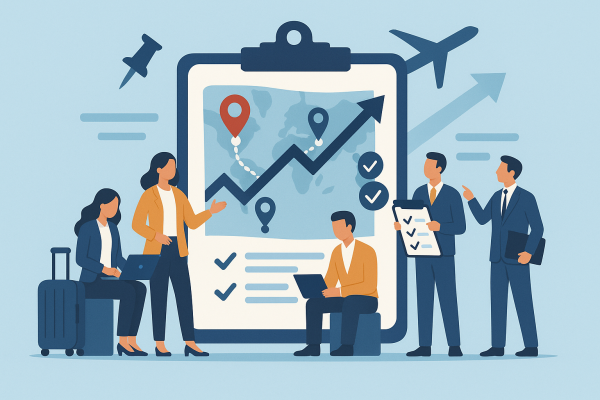Details of Doing Business Abroad: Transportation, Accommodation, and Schedule
Boost your business trip success with expert planning! Did you know poorly planned trips can slash productivity by 50%? This comprehensive guide reveals how a well-defined itinerary and smart travel strategies can save you time and money. Learn how to optimize flights, accommodations, and ground transport, plus discover essential tools and tips for a smooth, stress-free, and productive business trip. Read on to transform your travel experience.
Important information
- A well-defined travel policy and detailed itinerary are crucial for cost control and efficient business travel.
- Poorly planned trips can significantly reduce productivity (up to 50%) and negatively impact morale.
- Streamlining travel arrangements with tools like travel management software improves safety, efficiency, and cost management.
- Negotiating deals, booking in advance, and using public transport can lead to significant cost savings.
- Creating a comprehensive itinerary that includes flights, accommodations, meetings, and ground transportation is essential for a smooth and productive trip.
Understanding Business Travel Arrangements
Efficient business travel depends on careful planning. A well-defined travel policy is essential for cost control, establishing clear limits for flight and hotel expenses. A complete itinerary, combining all travel arrangements and bookings, is equally important.
- Use tools like TripIt or Google Travel to stay organized.
- Remember to include important details such as dates, flights, and ground transportation.
When exploring travel options, stick to company policy. Negotiating deals can lead to significant savings. Prioritize convenient flight times and schedule downtime before important meetings. Securing reliable local transportation is also essential.
- These steps contribute to a smooth and productive trip.
- Proactive planning ensures success.
Importance of Streamlining Corporate Travel
Streamlined corporate travel enhances cost control, ensuring your team arrives promptly. Efficient travel spending management is facilitated by a detailed itinerary encompassing dates, times, and meeting locations. This comprehensive plan simplifies booking flights, accommodations, and ground transportation.
Travel management software streamlines the booking process, establishes travel policies, and tracks travelers, thereby improving both safety and operational efficiency.
Impact of Lack of Proper Arrangements
Poorly planned business trips can significantly decrease employee productivity and morale. Missed flights and meetings result in lost time and missed opportunities, while inadequate accommodations affect rest and preparation, ultimately impacting job performance. Unforeseen expenses, like last-minute flight changes or unexpected taxi fares, can also strain budgets. A Global Business Travel Association study showed that poorly planned trips can reduce productivity by 50%. Therefore, meticulous travel planning is essential for successful business trips, ensuring smooth operations, boosting employee morale, and saving money.
Impact of Poor Travel Planning
- decreased productivity and morale,
- missed flights and meetings,
- lost time and missed opportunities,
- inadequate accommodations affecting rest and preparation,
- unforeseen expenses straining budgets.
Benefits of Meticulous Travel Planning
- ensures smooth operations,
- boosts employee morale,
- saves money.
Planning a Successful Business Trip
Planning a successful business trip involves several key steps.
Review your company’s travel policies and budget.
Research flights and accommodations, considering convenient times and the best deals.
Explore trip packages for potential savings.
Book flights and accommodations well in advance to secure the best rates and availability.
Use a travel management platform to organize your itinerary and share it with colleagues and family.
Research your destination, including local customs, amenities, and basic phrases in the local language.
Ensure your travel documents, such as passport, visas, and vaccination records, are up-to-date.
Calculate anticipated expenses for transportation, meals, and lodging.
Track expenses using apps or by keeping receipts for accurate reporting and responsible spending.
Creating a Mission-Critical Itinerary
A mission-critical itinerary is essential for organized travel. It seamlessly syncs with your flights and accommodations, incorporating crucial details like meeting times and locations. Utilize tools like TripIt, Google Travel, or even a simple spreadsheet to create one. This comprehensive plan streamlines logistics, preventing unforeseen issues and saving you valuable time and money. Your itinerary includes all your flight information and ground transportation arrangements, making it your central hub for trip details. Sharing this with colleagues or family enhances safety and coordination, keeping everyone informed. Here’s how to create an effective itinerary:
Choose your tool. Select a platform or method that suits your organizational style, whether it’s a dedicated app, online service, or a traditional spreadsheet.
Input essential travel details. Include flight numbers, arrival and departure times, hotel reservations, and ground transportation information.
Integrate meeting schedules. Add meeting times, locations, and contact information for seamless scheduling.
Incorporate contingency plans. Note alternative transportation options, backup contact numbers, and essential addresses.
Share with relevant parties. Distribute your itinerary to colleagues, family, or friends to ensure everyone stays informed and coordinated.
Exploring Travel Options
Planning your trip starts with a simple itinerary. Next, research flights, transportation, and accommodation. Use travel sites to compare airlines, considering prices, schedules, rebooking options, and layover durations. Then, explore ground transportation options like taxis, ride-sharing services, and public transit, weighing their costs, convenience, and travel times. Finally, book accommodations that balance location, amenities, and your budget.
Effective Transportation Strategies
Direct flights minimize delays and missed connections, making them the ideal choice. For a less crowded flight, consider traveling mid-week, particularly on Tuesdays or Wednesdays. Checking the airline’s on-time performance can also contribute to a smoother journey.
When you arrive, consider your ground transportation options. While taxis offer convenient door-to-door service, especially beneficial when managing luggage, public transportation is generally more economical. Buses, subways, and trains are all viable choices, and researching routes in advance will save you time and potential headaches.
- Taxis offer convenient door-to-door service.
- Public transport including buses, subways, and trains, are generally more economical.
- Ride-sharing services are another alternative, especially for longer journeys.
For extensive travel within a city, look into multi-day or weekly passes, which often offer unlimited rides and substantial savings.
Choosing the Right Flights to Avoid Delays
Searching for the ideal flight? Travel websites are your best resource for comparing airlines, prices, schedules, and even rebooking policies. Consider these tips for a smoother travel experience:
Avoid the crowds and snag an early morning flight. Booking in advance offers the added bonus of arriving refreshed and ready for your first meeting.
Be sure to factor in layover times. For budget-conscious travelers, corporate discounts and travel management companies can help cut costs.
Ground Transportation Options: Cabs vs. Public Transport
Cabs
cabs offer convenient, door-to-door service, a significant advantage.
Public Transport
public transport, including buses, subways, and trams, provides a more economical alternative. consider travel time, budget, and luggage when making your decision.
Saving on Transportation Costs with Public Transit
Traveling by public transport offers a budget-friendly alternative to taxis or ride-sharing services. Options such as buses, subways, and trams are considerably cheaper, allowing you to explore your destination without breaking the bank. Public transport also provides a unique opportunity to experience the city from a local’s perspective. Before embarking on your journey, research the local transit system and consider purchasing a travel pass for added savings.
Accommodation Arrangements for Business Travel
Choosing the right hotel is crucial for a successful business trip. Consider these key factors: proximity to meeting venues, leveraging booking sites for price comparisons and deals, essential amenities like Wi-Fi and a flexible cancellation policy, hotels with business centers or executive lounges to boost productivity, a central location to minimize travel costs, and hotels further from the city center for potential additional perks. Prioritize hotels with gyms and room service for a comfortable and efficient stay.
Essential Amenities
- Wi-Fi, essential for staying connected.
- Flexible cancellation policy, for unforeseen changes.
Boosting Productivity
- Business centers, providing convenient workspaces.
- Executive lounges, offering a dedicated space for work and relaxation.
Location Considerations
Central location: Minimizes local travel expenses.
Further from city center: May offer additional perks.
Comfort and Efficiency
- Gym access, for maintaining your routine.
- Room service, for convenient dining.
Researching and Booking the Best Deals
Compare rates across various booking platforms to find the best deals.
Negotiate directly with hotels, which can often lead to better rates, especially for travel managers.
Book in advance to secure cost savings and potentially access early bird discounts.
Utilize specialized services that can unlock corporate discounts and exclusive offers for added value.
Prioritize flexible cancellation policies to safeguard against unforeseen circumstances and potential disruptions.
Consider essential amenities such as Wi-Fi, a gym, or room service to enhance your comfort and convenience during your stay. Evaluate the importance of these features based on your individual needs and preferences.
Factor in location as a crucial element. Choosing a hotel near your meetings or the conference center minimizes travel time and maximizes efficiency.
Understanding Hotel Tariffs and Amenities
Hotel prices include more than just the cost of the room. Taxes, fees for extra services like Wi-Fi, breakfast, and airport transfers all add to the total cost. Carefully reviewing these charges can help travelers save money and still comply with company travel policies.
Scheduling and Time Management Abroad
Planning a successful business trip involves setting clear, attainable objectives that align with your timeframe. Effectively manage deadlines and time off, rescheduling any conflicting appointments if your trip is urgent. Factor in travel time between meetings, noting arrival and departure times to maximize efficiency.
Optimize Your Schedule
Research public and private transportation options in your destination country. Pre-booking transport, such as hiring a driver, or familiarizing yourself with public transit can save valuable time. Checking local workdays and business hours will prevent scheduling conflicts.
Maximize Productivity
Leverage travel time productively by catching up on emails or preparing for meetings. Staying connected ensures seamless communication. Find quiet spots for work or relaxation between meetings to enhance productivity.
Creating a Well-Planned Itinerary
A well-planned itinerary is key to organized travel, seamlessly combining your plans with flights and accommodations. This detailed roadmap should include travel dates, flight details, and ground transportation information. Leverage tools like TripIt, Google Travel, or a simple spreadsheet to build and track your trip. A solid itinerary maximizes your time abroad, ensuring a productive business trip and enhancing safety by sharing it with colleagues or family. Here’s how to create an effective travel itinerary:
Choose your destination and travel dates. Research your destination and decide on the best time to travel. Consider factors like weather, local events, and peak seasons.
Book your flights and accommodations. Once you have your dates, book your flights and accommodations in advance, especially during popular travel times. Look for deals and compare prices using different platforms.
Plan your activities. Research and choose the activities you want to do at your destination. Consider booking tours or tickets in advance, especially for popular attractions.
Arrange ground transportation. Decide how you will get around at your destination. Options include renting a car, using public transportation, or taking taxis or ride-sharing services.
Organize your documents. Make sure you have all necessary travel documents, such as your passport, visa (if required), and any necessary travel insurance information. Keep digital copies of your documents as well.
Maximizing Time with Efficient Scheduling
Smart scheduling is essential for successful business trips. Strategically planning meetings and activities, along with a well-crafted itinerary, maximizes your time and productivity, helping you achieve your objectives. A well-structured plan minimizes wasted time and allows for flexibility, enabling you to adapt to unexpected situations or opportunities that may arise. Consider these key aspects: clearly defined objectives, realistic timeframes, and buffer periods for unforeseen delays. Prioritize tasks and allocate sufficient time for each, ensuring you avoid over-scheduling. Finally, leverage technology such as scheduling apps and travel management tools to streamline your arrangements and stay organized.



















